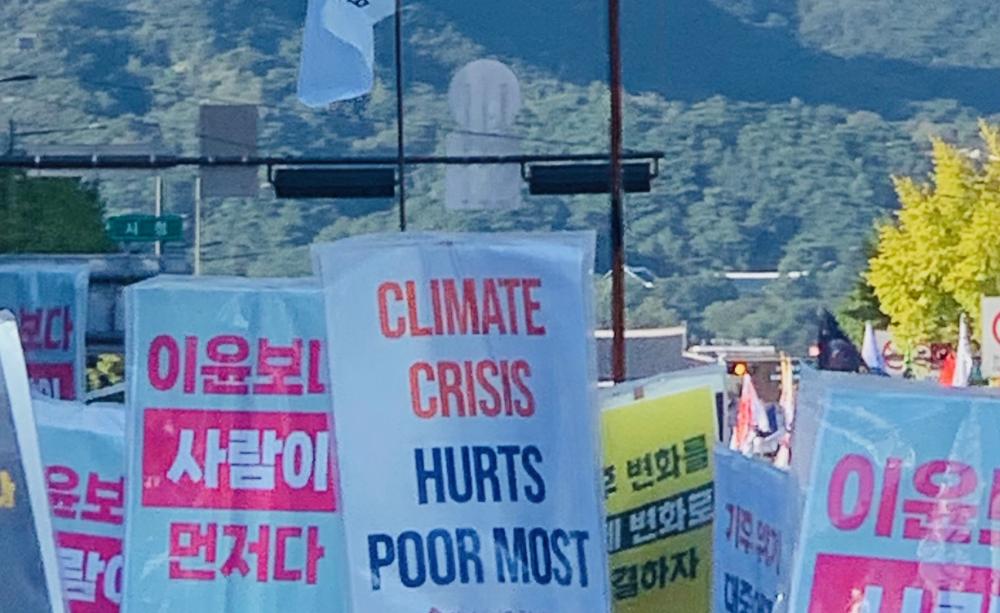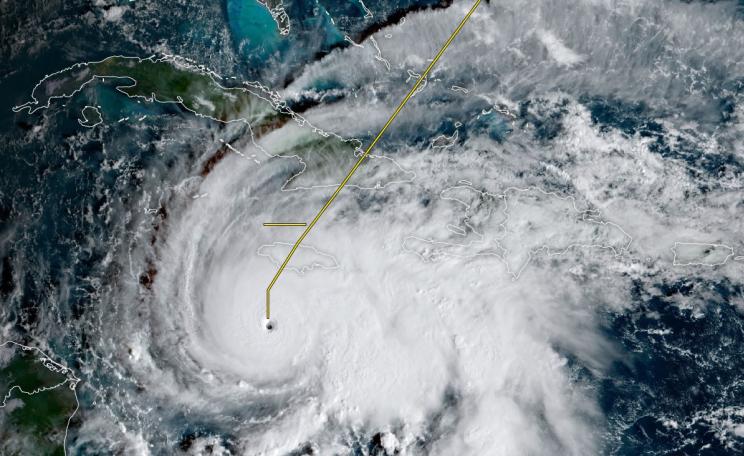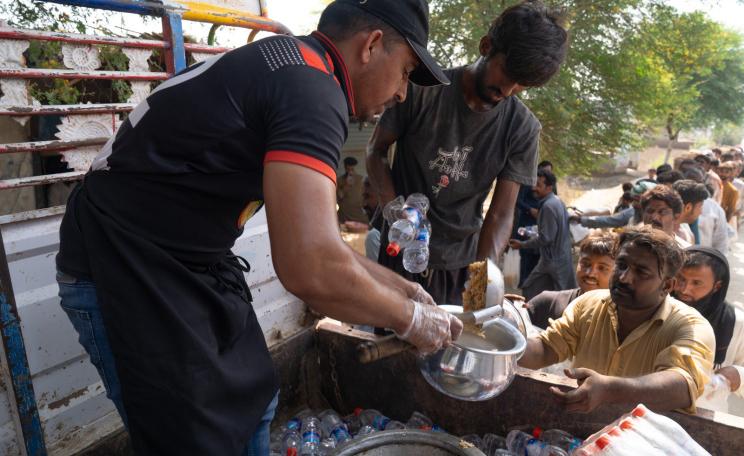If these fierce Gen Z movements across the Global South start to link up and fight atmospheric colonisation and climate breakdown, fossil capital should probably watch out.
An apocalyptic heat wave hits India in the year 2025. The heat kills millions of people when power grids fail across the country. In Uttar Pradesh, an aid worker from the US, Frank, desperately tries to save lives as the temperature rises over the course of a day.
While moving a generator to the clinic where people are sheltering from the heat, he is robbed. One of the thieves points a gun at Frank and says, “You did this.”
TAKE ACTION: The 927 Climate Justice March will be held on Saturday, September 27, at 12:30 in Gwanghwamun, Seoul.
The thief blames Frank for the deaths caused by the heat wave, and by extension, wasteful, climate-change denying Americans, and more broadly, the countries of the Global North that are most responsible for the climate crisis.
Dominate
This horrifying scene opens Kim Stanley Robinson’s The Ministry for the Future, a science fiction novel that explores the intersection of capitalism, colonialism, and climate breakdown, as well as the actions needed to heal the biosphere of the planet, both for us and for future generations, human and nonhuman, who deserve climate equity too.
The Ministry for the Future made a significant impact on debates over the climate crisis when it was published in 2020. Activists, economists, the United Nations, Barrack Obama, climate scientists, and ordinary readers were all talking about this epic novel, not just sci-fi fans or literature professors.
This was similar to the impact Harriet Beecher Stowe’s Uncle Tom’s Cabin had on debates over slavery, or George Orwell’s 1984 had on discussions of the Cold War.
As The Ministry for the Future makes clear, colonialism isn’t over, it’s just taken new forms.
Jason Hickel is the author of Less is More: How Degrowth Will Save the World (2020). In his essay 'The Global South has the Power to Force Radical Climate Action', He writes: “Western economies – and the corporations and elites that dominate them – are overwhelmingly responsible for this crisis.
Displaced
"They have contributed more than 90 percent of the excess emissions that are driving climate breakdown … Meanwhile, the impacts fall hardest on the countries of the Global South … The climate crisis is playing out along colonial lines.”
We are witnessing the emergent power of the Global South in the Gen Z–led demonstrations in Sri Lanka, Bangladesh, Indonesia, and most recently Nepal, that are occupying and toppling governments.
In The Ministry for the Future, this power appears in the form of a violent direct action group, the Children of Kali – Kali being the Hindu goddess of creation and destruction – that adopts extreme measures to force the rapid decarbonization of the planet.
If these fierce Gen Z movements across the Global South start to link up and fight atmospheric colonisation and climate breakdown, fossil capital should probably watch out.
If these fierce Gen Z movements across the Global South start to link up and fight atmospheric colonisation and climate breakdown, fossil capital should probably watch out.
While the impacts of climate breakdown are falling hardest on the Global South, here in South Korea, rural areas are being hit hardest. In March and early May, wildfires in the central and southern parts of the country killed 32 people and displaced around 10,000.
Emitted
In July, flooding killed at least 34 people and forced around 10,000 to evacuate. As of August 25, there have been 26 heat-related deaths. And on top of all that, Gangneung is now experiencing a devastating drought. These are not natural disasters; they are fossil-fueled crime scenes.
As Jeff Goodell points out in The Heat Will Kill You First (2023), fossil fuel companies could soon be sued for “deaths or property destruction and economic losses from every climate-driven flood and heat wave–past, present, and future.”
I can imagine Korean families who lost loved ones in the recent wildfires, flooding, and heat waves, standing in court, pointing a finger at Big Oil, and saying, “You did this.”
This may sound melodramatic, and of course extreme weather attribution is a very complicated, contested, and lengthy process.
But a recent study published in the journal Nature, 'Systematic attribution of heatwaves to the emissions of carbon majors', reveals that scientists may soon be able to connect worsening heat waves to the 14 biggest “carbon majors", the largest fossil fuel and cement producers responsible for most of the carbon being emitted into the atmosphere.

Strikes
For the families of the 26 people who died this summer from the heat wave, saying “you did this” in a legal setting isn’t melodrama, it’s climate justice.
Despite opening with an apocalyptic climate disaster, The Ministry for the Future is a scientifically grounded and rigorously hopeful novel that encourages readers to care about future generations who will struggle to live on a planet on fire.
As it moves from the heat disaster of 2025, through the “zombie years” of the 2030s, and toward a cooling planet by 2050, the novel assembles the many forces needed to reduce the amount of carbon in the atmosphere, ranging from the United Nations to direct action, from degrowth to rewilding, from geoengineering to the environmental humanities, just to name a few.
In the novel, there is no silver bullet that will stop climate breakdown; rather, it’s “all-hands-on deck” as Robinson often says. On September 27 in Seoul, South Korea, it will be all feet on the street at the 927 Climate Justice March.
The climate justice marches in Seoul began in 2019 and were inspired by Fridays for Future and global climate strikes.
Vulnerable
Every September, the demonstrations for the planet and against climate breakdown get bigger and louder and angrier.
The six fundamental demands of the 927 Climate Justice March this year are: for just reduction targets and a just transition to a green economy; for a just and sustainable energy transition; for a stop to unilateral growth policies and destructive development projects; for safe, dignified lives and strong social services; for farmers’ rights and the right to healthy food; for an end to war and genocide.
The Ministry for the Future aligns with all these demands, especially the critique of the capitalist pursuit of endless growth, which ignores planetary boundaries, destabilizes the biosphere, and makes low-income communities and communities of color around the world more vulnerable to extreme weather events.
We all saw the impact of extreme weather on a vulnerable community in Bong Jun-ho’s Parasite, when the Kim family’s basement apartment is flooded and they become homeless and take refuge in a gymnasium.
Status quo
I was reminded of this scene when I saw pictures of elderly people displaced from their homes by wildfires in Uiseong County, North Gyeongsang Province back in March.
Elderly Korean people living in rural areas, like rural communities in the Global South under-developed by colonialism and neoliberalism, are least responsible for climate breakdown but are suffering the most, and we need to fight for justice and equality for everyone.
There is a lot of anger circulating in Ministry and at the climate justice demonstrations, but they are also mutualistic celebrations of all forms of life on this planet, of multispecies entanglements, amidst biological annihilation and mass extinction.
The novel and demonstration foreground utopian, postcapitalist alternatives to the status quo – cooperatives like Mondragon in the former and Hansalim in the latter – that exist in the world right now and urgently need to be scaled up.
Generations
As Rebecca Solnit writes in Hope in the Dark, “What we dream of is already present in the world.”
Climate anxiety has become a very serious issue, especially for young people. Anyone who is feeling depressed, anxious, scared, or hopeless because of the wildfires, flooding, heat waves, and drought might consider joining the 927 Climate Justice March.
There is strength in numbers, and there is emotional comfort in numbers. There is always a lot of joyful dancing and singing and drumming at the demonstrations, along with imaginative costumes and cool art.
Many of us need that right now. We need to support each other, to expand our mutual aid networks, as we work and fight to cool the planet, both for us and for future generations.
This Author
John R. Eperjesi is a Professor in the Department of English Linguistics and Literature at Kyung Hee University in Seoul and works in the environmental humanities.
Philosophik will publish the Korean translation of The Ministry for the Future in Spring 2026. An earlier version of this article originally appeared in Korean in OhMyNews.
The 927 Climate Justice March will be held on Saturday, September 27, at 12:30 in Gwanghwamun, Seoul.




